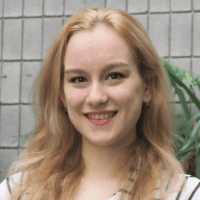
“Characterizing long non-coding RNA in the Asian Citrus Psyllid through genome annotation and molecular biology”
Project Summary:
Huanglongbing (HLB), or citrus greening disease, is jeopardizing the citrus industry around the world. HLB is an incurable disease of citrus that results in yield loss, decline of tree health and ultimately death of the plant. It is associated with the pathogen Candidatus Liberibacter asiaticus (CLas), which is spread by Diaphorina citri, or the Asian citrus psyllid (ACP), when psyllids harboring CLas feed on healthy citrus. It is important to note that in order to be effective vectors of CLas, psyllids must acquire CLas as nymphs, the juvenile life stage of the psyllid. My project focuses on interactions between CLas and ACP nymphs, specifically investigating the role of long noncoding RNA (lncRNA). Recent work by the Heck lab identified 83 differentially expressed lncRNAs in the gut of adult ACPs, when exposed to CLas as nymphs, through multi-omics. By identifying and characterizing these lncRNA, we can better understand the relationship between the vector ACP and the pathogen CLas. I identified lncRNA in the ACP genome using multiple bioinformatics pipelines and validated the presence of lncRNA in nymphs with reverse transcription polymerase chain reaction (RT-PCR) and cloning methods. Specific lncRNA found in the adult ACP gut were confirmed to be present in nymphs. Interestingly, expression seemed to vary based on host plant. The end goal of this research is to identify the role of lncRNA in CLas transmission, which will hopefully lead to the development of methods that slow or even stop the spread of HLB.
My Experience:
My experience at the Boyce Thompson Institute has been phenomenal. From patient, understanding mentors to a friendly work environment, BTI has allowed me to grow as a scientist and gain skills I had never been exposed to before. Though this summer was challenging, I was able to overcome the difficulties I faced in my research. It would not have been possible without my wonderful mentors, Angela Kruse, Surya Saha, and Prashant Hosmani, and the endless support provided by both the Mueller and Heck Labs. Without them, I would have never considered plant genetics as a possible career track. The lab and technical skills I learned at BTI will continue to aid me as a researcher as I embark upon the adventure of my career. I encourage anyone who is considering a career in research to apply to this program and immerse themselves in the inspiring community that is BTI.
